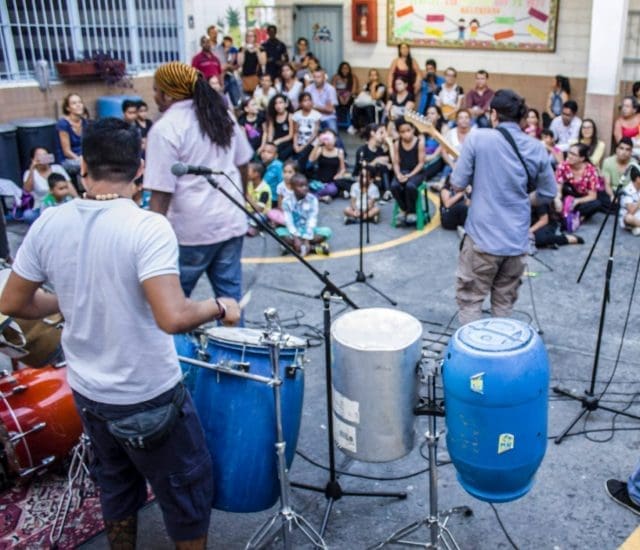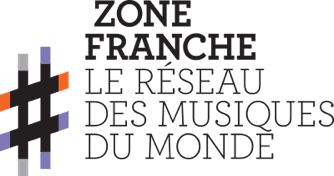Mr Klaje was not just founded in Cali, Colombia, by chance but as an overlap of different recurring issues affecting the country and its towns. Colombia as a whole is on a fragile peace process which started in 2016 after the violent internal conflict the country suffered, the Conflicto armado interno de Colombia, which had, since its beginning in the 1960s, not only killed more civilians than fighters, but also displaced individuals, making the conflict the world’s second-largest flow of internally displaced persons. In the midst of the power vacuum left behind by the start of the transition towards peace, Colombian towns have been affected by organized crime, whether it be guerilla, drug cartels, armed gangs or other underworld activities, threatening once more the safety of the population, already poor and suffering from undernourishment, deficient food and deficient housing. These factors make music learning and playing neither affordable nor the priority. Added to these weights, Cali is overwhelmed with its own ever growing waste production, mainly recycled by the informal sector, or laid down in landfills. Still, in the middle of Cali, a music band saw the situation as an opportunity both to positively use waste and to fight for peace.
The band Mr. Klaje was formed in 2010 by students of the Institute of Popular Culture of Santiago de Cali. This group of students could not afford instruments and thus started to reuse trash cans as drums. Raising awareness on the reusability of trash to create music instruments came from their ambition to associate their knowledge and love for music with environmental protection. Their engagement was rooted in the belief that any negative situation could be turned into a positive one.
Environmental protection was not the only side to their mission. Deeply aware of the social unrest within their neighborhoods, the band gradually realized that they had in their hands the power to promote peace. Bringing music and art to the youngest was, as they hoped, the best means to inspire them and keep them off the streets.
Mr. Klaje thus designed a workshop for youngsters that teaches them how to recycle used materials and convert them into music instruments. The workshop first took place in 2018 in Quibdó, a place significantly struck by violence, where Mr Klaje’s initiative brought people from different backgrounds together to create and make music. Bringing reconciliation through shared artistic activities stood as the premise on which the group hoped to offer opportunities for children to stay away from gang violence.
Since the initial success of this workshop, the band continues to lead initiatives promoting environmental protection and social peace remaining very vocal, especially on social media. The head of the project Juan Manuel Gomez considers Mr Klaje’s work crucial because it helps « transforming imaginations, bad practices, and violent conduct » and thus hopefully can contribute to leading communities towards « a more integrated idea of peace and social equality ».
These wills are expressed in their music as well, both through their lyrics and through their style. Their lyrics are committed, with an intent to make listeners reflect on different social but also environmental issues. The range of issues is wide, so is their style, as it is open and fluid, a “Chatarra Groove” (Scrap Groove) as the members of the band define it. Their music can be seen as a mix of rap, funk, rock, salsa, reggae and many other Colombian musical genres. All in all, their music is an exploration of all stylistic possibilities with a single remaining characteristic : the scrap, namely the recycled instruments. Their peculiar sounds add flavor to Mr Kaje’s committed music pieces promoting a better future.
The authors : Juliette Dhulst & Lilly Fairier
Both second year students at Sciences Po Paris, the two authors have their own journey with music.
Explored more academically on Juliette’s side with the learning of the clarinet from age 7, Lilly on the other hand remains an autodidact for the piano and the ukulele.
Passionate students and deeply concerned with environmental issues, their shared love for music resonates even more when music becomes a social tool to shape a better future.
This article is a result of a collaborative project between #AuxSons and Alejandro Abbud Torres Torija, lecturer at Sciences Po Paris Campus Reims, and regular contributor to #AuxSons. As part of the class “Sounds of the world : Music as mirror of the intimate and the collective”, international students from Sciences Po Paris Campus Reims prepared articles presenting contemporary music from different parts of the world in connection with recent socio-political events.
Cet article en anglais est le résultat d’un projet collaboratif entre #AuxSons et Alejandro Abbud Torres Torija, professeur à Sciences Po Paris Campus Reims, et contributeur régulier d’#AuxSons. Dans le cadre du cours “Sons du monde : la musique comme miroir de l’intime et du collectif” des étudiants internationaux de Sciences Po Paris Campus Reims se sont penchés sur les liens entre musiques des quatre coins du monde et enjeux sociopolitiques.


